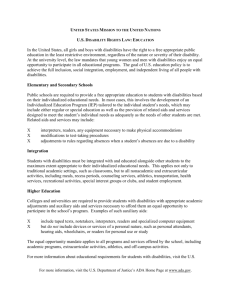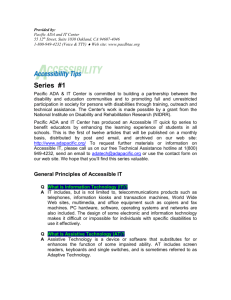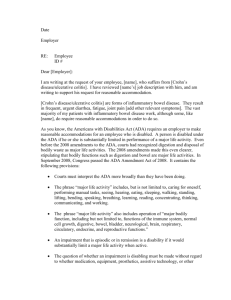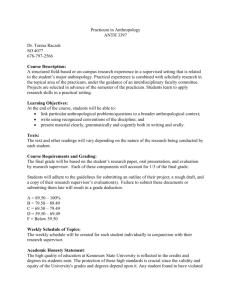The American with Disabilities Act (ADA)
advertisement
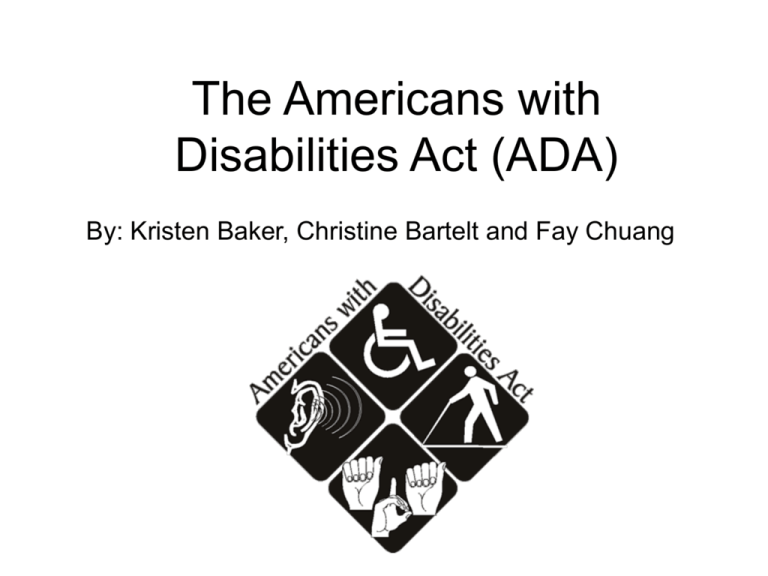
The Americans with Disabilities Act (ADA) By: Kristen Baker, Christine Bartelt and Fay Chuang What is the purpose of the ADA? • The ADA was established on July 26, 1990. • The ADA is a set of laws that was put in place to eliminate discrimination against individuals with disabilities, including people who are deaf and hard of hearing. • Provides “enforceable standards addressing discrimination.” • The ADA helps 43 million Americans with disabilities. • About 24 million of these people have a hearing loss. What is a Disability? • A physical or mental impairment that greatly impacts the “major life activities” and “major bodily functions” of an individual. • “Major life activities” include: Caring for oneself, performing manual tasks, seeing, hearing, eating, sleeping, walking, standing, lifting, bending, speaking, breathing, learning, reading, communicating and working. Areas covered under ADA • Stores, businesses, and public accommodations • Telecommunications • Employment • Medical treatment • State and local governments, courts and attorneys What does this mean for you? 1. Stores, Businesses and Public Accommodations • Public places (stores, businesses, airports, movie theaters, concert halls, libraries, restaurants, etc.) all need to provide auxiliary aids or services for deaf and hard of hearing individuals. • Some examples of auxiliary aids are a pen and piece of paper,TDDs/TTYs and ALDs. Services may include qualified interpreters and closed captioning. 2. Telecommunications • Telecommunications Relay Services (TRS), Video Relay Services, or Internet Protocol(IP)Relay Services are government funded services that make communication via technological devices easier. • Individuals with hearing loss can contact standard phone/internet users using a TDD (telecommunications device for the deaf), TTY (teletype typewriter) and other assistive telephone/computer devices. 3. Employment • Employers cannot discriminate during the application process,hiring, firing,employee training, compensation/position review or deny a disabled employee benefits due to his/her disability. • An individual with a disability should be able to perform the basic tasks associated with the job without help. • Reasonable accommodations must be made by the employer. • A job should be adjusted, whenever possible, to allow a disabled individual the opportunity to perform their job duties successfully. 4. Medical Treatment • Any medical treatment center receiving government money must provide certain services to the deaf and hard of hearing. • The individual must be able to communicate with doctors and nurses in their preferred communication mode (i.e. English, Spanish, ASL, fingerspelling, manually coded English, speech reading etc.) • The hospital can NOT charge extra fees for providing these accommodations. • Special accommodations must be requested in advance. • Private practice doctors must also provide accommodations at no additional cost. • *Family members are not acceptable interpreters.* 5. State and Local Government, Courts, Attorneys • Individuals with a hearing impairment must be able to participate in all government services. • The agency in question must provide auxiliary aids and services, but they must be requested in advance. • The aids and services must be paid for by this agency. • For example, a deaf person is entitled to have an interpreter (at no cost) if he/she will be in a court trial. Other ADA sections • Fair Housing Act • Voting Accessibility for the Elderly and Handicapped Act • Individuals with Disabilities Education Act – IDEA requires public schools to provide a free public education to all eligible children with disabilities in the least restrictive environment appropriate to their individual needs. An Individualized Education Programs (IEP) is made to reflect each child’s needs. • Rehabilitation Act ADA • The ADA is a “complaint driven law” • Be aware of your rights and report any ADA breaches • Advocate for yourself • Ask for available assistive devices and services • Educate those in your community about the ADA and what it requires SOURCES • • • • • • www.ada.gov http://www.ada.gov/infoline.htm http://www.ada.gov/q%26aeng02.htm http://www.eeoc.gov/facts/fs-ada.html www.azrelay.org http://synergyemusic.com/ada.yourrights.html




